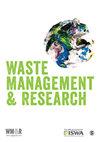城市农业对家庭有机废物管理习惯产生积极影响:巴西弗洛里亚诺波利斯的一项定量研究。
IF 3.7
4区 环境科学与生态学
Q3 ENGINEERING, ENVIRONMENTAL
引用次数: 0
摘要
正确的家庭有机废物管理方法对于限制城市废物处理不当对环境和健康造成的负面影响至关重要。有机废物对环境的影响以前在文献中已有描述,管理此类废物的主要处理策略依赖于生物发酵罐等技术设施。然而,这类技术需要大量资金投入,这可能会阻碍其在经济实力较弱地区的应用。在现有的几种有机废物处理策略中,用于城市农业(UA)的堆肥越来越受欢迎。虽然有文献表明,城市农业堆肥可以通过鼓励自我处理实践来促进有机废物管理,但迄今为止,有关城市农业堆肥如何影响家庭废物管理行为的调查还很有限。为此,我们分析了 "普遍获得 "与其他人口变量(如年龄、性别、教育程度、收入和住房条件)在影响公民家庭有机废物管理行为方面的作用。我们选择巴西弗洛里亚诺波利斯市作为案例研究对象,因为该市最近通过了一项新的有机废物管理法,支持在 "统一处理 "中使用有机堆肥。我们从以下四个行为领域对 206 名个人的家庭有机废物管理习惯进行了调查:(i) 分类;(ii) 使用公共服务;(iii) 自我处理;(iv) 减少。数据集包括 102 名积极参与 "普遍获得 "活动的人和 104 名未参与 "普遍获得 "活动的人,以比较两组人的习惯。结果显示,"普遍获得 "实践者更倾向于分类和自我处理有机废物,并将所得堆肥用于园艺活动。使用公共设施进行有机废物管理受到人们住房条件的影响。从逻辑上讲,居住在没有花园的公寓中的受访者比居住在有花园的公寓中的受访者更不愿意自行处理产生的有机废物。另一方面,研究结果表明,无论住房条件如何,普遍获得者都会自己堆肥有机废物。结果表明,"普遍获得 "实践对自制堆肥有很大的积极影响,从而突出了这种实践在提高城市居民对废物管理问题的认识和支持当地有机废物管理战略方面的作用。尽管关于 "普遍获得 "在有机废物管理中的作用的争论仍未结束,但我们发现,突出这一作用有助于转向有机废物处理的循环方法。本文章由计算机程序翻译,如有差异,请以英文原文为准。
Practising urban agriculture positively influences household organic waste management habits: A quantitative study from Florianópolis, Brazil.
Proper household organic waste management practices are crucial to limit the negative environmental and health impacts that can result from inappropriate municipal waste treatment. The environmental impacts of organic waste have previously been described in the literature, and the main treatment strategy for managing such waste relies on technical facilities such as biodigesters. However, such technologies require significant financial investments, which could hinder their application in areas with lower economic power. Among the several available organic waste treatment strategies, composting for urban agricultural (UA) use has become increasingly popular. Although the literature suggests that UA can contribute to organic waste management by encouraging self-treatment practices, investigations into how practising UA can influence household waste management behaviours have been limited thus far. To this end, we analyse the role of practising UA along with other demographic variables, such as age, gender, education, income and housing conditions, in influencing citizens' household organic waste management behaviours. The city of Florianópolis, Brazil was selected as a case study since that municipality recently passed a new organic waste regulation law that supports the use of organic compost in UA. We surveyed 206 individuals regarding their household organic waste management habits in four behavioural areas: (i) separation, (ii) use of public services, (iii) self-treatment and (iv) reduction. The dataset comprises 102 individuals who were actively engaged in UA activities and 104 who were not involved in UA to compare habits of the two groups. The results show that UA practitioners are more likely to separate and self-treat their organic waste and use the derived compost for gardening activities. The use of public facilities for organic waste management is influenced by people's housing conditions. Respondents who lived in an apartment with no access to a garden logically had a lower willingness than did those with garden access to self-treat the organic waste produced. On the other hand, the results show that UA practitioners compost their own organic waste regardless of their housing conditions. The results show a strong, positive influence of practising UA on self-composting and thereby highlight the role of such practices in sensitizing urban residents to waste management issues and supporting local organic waste management strategies. Although the debate over the role of UA in organic waste management is still open, we reveal that highlighting this role could support a shift towards a circular approach to organic waste treatment.
求助全文
通过发布文献求助,成功后即可免费获取论文全文。
去求助
来源期刊

Waste Management & Research
环境科学-工程:环境
CiteScore
8.50
自引率
7.70%
发文量
232
审稿时长
4.1 months
期刊介绍:
Waste Management & Research (WM&R) publishes peer-reviewed articles relating to both the theory and practice of waste management and research. Published on behalf of the International Solid Waste Association (ISWA) topics include: wastes (focus on solids), processes and technologies, management systems and tools, and policy and regulatory frameworks, sustainable waste management designs, operations, policies or practices.
 求助内容:
求助内容: 应助结果提醒方式:
应助结果提醒方式:


